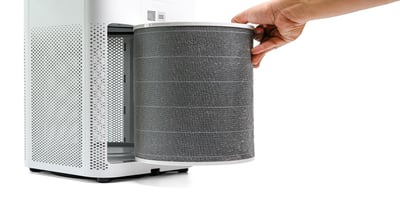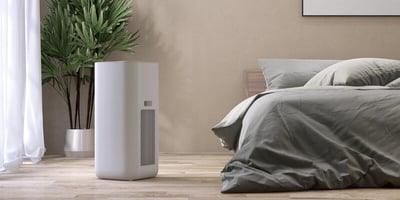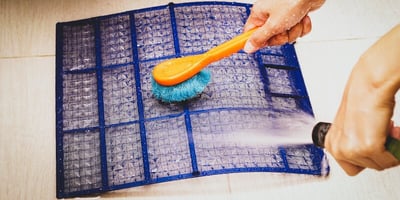The Lifespan of HEPA Filters: How Long They Last and Why?
In today's world, where air quality has become a paramount concern for health-conscious individuals, High-Efficiency Particulate Air filters stand out as a beacon of hope. These sophisticated filters are the gold standard in air purification technology, capable of trapping 99.97% of particles that are 0.3 microns in diameter or larger. This includes a wide array of pollutants such as dust, pollen, mold spores, smoke, and bacteria, making HEPA filters an indispensable tool in the quest for cleaner indoor air. Whether used in homes, offices, healthcare facilities, or industrial settings, the effectiveness of HEPA filters in enhancing air quality and protecting against airborne contaminants is undisputed.
Understanding the lifespan of HEPA filters is crucial not only for ensuring optimal air purification performance but also for maintaining the efficiency and longevity of air purifying systems. This article delves into the various factors that influence how long HEPA filters last, from usage and environmental conditions to maintenance practices and filter quality. By exploring these aspects, we aim to provide a comprehensive guide on what to expect from your HEPA filters and how to maximize their effectiveness through their service life. Join us as we uncover the essentials of HEPA air filter, performance, maintenance and replacement, ensuring your living or working environment remains a sanctuary of clean air.
What Are HEPA Filters?
HEPA filters, an acronym for High-Efficiency Particulate Air filters, represent a pinnacle of air filtration technology designed to capture a vast majority of airborne particles. These filters must meet a specific standard set by the U.S. Department of Energy, which requires them to remove at least 99.97% of particles that are 0.3 micrometers in diameter from the air that passes through them. This size of particle is considered the most penetrating particle size (MPPS), challenging to filter out due to its ability to follow the air stream. The efficiency of HEPA air filters at capturing these particles makes them highly effective against a broad spectrum of contaminants, including dust, pollen, mold spores, certain viruses, and bacteria, as well as many other microscopic airborne particles.
Explanation of HEPA filters, including what HEPA stands for and the technology behind it
The technology behind HEPA filters involves a complex web of randomly arranged fibers, typically made from fiberglass. The diameter of the fibers, the filter thickness, and the face velocity (the speed at which air flows through the filter) are all critical in determining the filter's effectiveness. Particles are trapped in new filter through a combination of the following mechanisms:
- Interception, where particles following a line of flow in the air stream come within one radius of a fiber and adhere to it.
- Impaction, where larger particles are unable to avoid fibers by following the curving contours of the air stream and are forced to embed in one of the fibers directly.
- Diffusion, an enhancing mechanism that results from the collision of gas molecules with the smallest particles, especially those below 0.1 microns in diameter, which are thereby impeded and delayed in their path through the filter.
The role of HEPA filters in air purification systems.
In air purification systems, HEPA filters serve as a critical barrier against pollution, effectively cleaning the air of potentially harmful particles that can exacerbate allergies, asthma, and other respiratory conditions. They are commonly used in residential, commercial, and industrial settings, as well as in critical applications where clean air is mandatory, such as in hospitals, laboratories, and pharmaceutical manufacturing. The role of HEPA filters extends beyond just improving air quality; they also contribute significantly to the containment of airborne diseases and protecting sensitive environments from contamination.
Factors Influencing the Lifespan of HEPA Filters
The lifespan of HEPA filters is determined by a variety of factors, each playing a crucial role in how effectively and for how long these filters can perform their task of purifying the air. By understanding these factors, users can make informed decisions to determine and maximize the efficiency and longevity of their HEPA filters.
Usage
The frequency with which a HEPA filter is used has a direct impact on its lifespan. Filters in air purification systems that operate continuously or for long periods daily are exposed to more airborne particles and, therefore, accumulate debris more quickly. This increased load can cause the filter to reach its particle saturation point sooner, necessitating a replacement to maintain air quality and system efficiency. Simply put, the more a filter is used, the quicker it will need to be replaced.
Environment
The surrounding environment is a significant determinant of a HEPA filter's durability. Filters deployed in areas with high levels of air pollutants, such as urban settings with dense traffic or industrial areas, typically have shorter lifespans due to the higher concentration of contaminants they must filter. Similarly, households with pets may find that their HEPA filters need more frequent replacements due to pet hair and dander. Environmental factors such as tobacco smoke, construction dust, and even the prevalence of pollen can also contribute to quicker filter saturation.
Filter Quality
The quality of the HEPA filter itself is a critical factor influencing its lifespan. High-quality filters, constructed with superior materials and more robust manufacturing standards, are designed to last longer and perform better, even under demanding conditions. These filters may incorporate advanced designs that increase surface area for particle capture pre filter, without sacrificing airflow, thereby extending their operational life. In contrast, lower-quality filters may fail to maintain efficiency over time, clogging more quickly and requiring more frequent replacements even if they initially seem to offer a cost-saving advantage.
Maintenance
Proper maintenance can significantly extend the operational life of most air purifier filters such a HEPA filter. While HEPA filters cannot be washed and reused like some other types of filters, certain maintenance steps can help ensure they perform efficiently for as long as possible. Regularly inspecting the filter for buildup of particulates and following the manufacturer's guidelines for replacement are key. Additionally, many air purification systems include pre-filters that catch larger particles before they reach the HEPA filter. Keeping these pre-filters clean can greatly reduce the load on the HEPA filter, prolonging its useful life.
Average Lifespan of HEPA Filters
The average lifespan of HEPA filters can vary significantly depending on their usage, environment, quality, and maintenance, as previously discussed. However, as a general guideline, HEPA filters typically last between 6 months to 3 years before needing replacement.
Residential Use
In a standard residential setting, the HEPA air filters often need to be replaced approximately every 12 to 18 months. This timeframe can be affected by factors such as the presence of pets, the level of indoor and outdoor pollution, and how frequently the air purifier is used. Homes in high-pollution areas or households with multiple pets might find that their HEPA filters require replacement closer to the 6-month mark due to the increased particle load.
Commercial or Industrial Use
In commercial or industrial environments where air purifiers may run more continuously and be exposed to a higher volume of air pollutants, HEPA filters might have a shorter lifespan. In these settings generally, filters may need to be checked and possibly replaced every 6 to 12 months, depending on the specific conditions of the air filter, the environment and the type of pollutants they are filtering.
Quality and Maintenance
High-quality HEPA filters, especially those designed with larger surface areas and more durable materials, can last towards the upper end of the average lifespan range tested, potentially exceeding 2 years in optimal conditions with proper maintenance. Regular maintenance and replacement filters, including replacing pre-filters and cleaning the external surfaces of the HEPA filter according to the manufacturer's instructions, can also significantly impact the filter's effective lifespan.
Variations in Lifespan
It's important to note that the "6 months to 3 years" range is quite broad, and the exact lifespan will depend heavily on the factors mentioned. For example for instance:
- Usage: Filters in systems that operate 24/7 will have a shorter lifespan than those used less frequently.
- Environment: Filters used in clean, low-pollution environments will last longer than those in high-pollution or dusty areas.
- Maintenance: Filters that are well-maintained, with regular checks and care, can last longer than those that are neglected.
Signs That It's Time to Replace Your HEPA Filter
Recognizing when a HEPA filter is nearing the end of its useful life is crucial for maintaining clean, optimal air quality and the maximum efficiency out of your air purification system. Several signs can indicate it's time to replace your HEPA filter:
Reduced Airflow
One of the most noticeable signs that a HEPA filter needs replacing is a noticeable decrease in airflow through the old filter. As the filter captures more particles, its pores can become clogged with particulate matter, making it harder for air to pass through. This reduction in airflow can lead to less efficient air purification and may cause the air purifier to work harder, potentially shortening its lifespan.
Increased Noise
An increase in noise from your air purifier can also indicate a clogged HEPA filter. As the filter becomes more blocked, the air purifier unit's fan may need to work harder to pull air through the filter, resulting in louder operation. This increased effort to maintain airflow can also lead to a decrease in the air purifier filter's efficiency and effectiveness.
Visible Dirt and Debris
While HEPA filters are designed to capture microscopic particles not visible to the naked eye, a significant accumulation of dust and debris on the filter's surface can be a clear sign that it's time for a replacement. If the filter appears visibly dirty or clogged even after removing any dirty pre-filters or larger debris from permanent filters, it's likely no longer performing at its best.
Odor
A noticeable increase in odors or a musty smell coming from the air purifier can be a sign that the HEPA filter is saturated and can no longer effectively remove odor-causing particles from the air. This is especially true for filters exposed to smoke, pet odors, or cooking smells over a long period.
Allergy Symptoms
If you or your family members start to experience an increase in allergy symptoms indoors, it could be a sign that your HEPA filter is no longer effectively removing allergens from the air. Symptoms such as sneezing, coughing, or itchy eyes can indicate that it's time to check and possibly replace your filter.
Manufacturer's Recommended Replacement Schedule
It's always important to consider the manufacturer's recommended filter replacement and schedule for your specific HEPA filter. Even if you haven't noticed any of the above signs, following the suggested filter replacement timeline can help ensure that your air purifier continues to operate efficiently and effectively.
Tips for Extending the Life of Your HEPA Filter
Extending the life of your HEPA filter not only ensures that you maintain high air quality but also can lead to significant savings over time. Here are some essential preventive maintenance tips and best practices for using HEPA filters to maximize their lifespan:
Pre-Filter Use
- Utilize Pre-Filters: Many air purifiers come with pre-filters that capture larger particles before they reach the HEPA filter. Regularly cleaning or replacing these pre-filters can significantly reduce the load on the HEPA filter, allowing it to focus on smaller particles and extending its useful life.
Proper Installation
- Ensure Correct Installation: Incorrectly installed HEPA filters can allow air to bypass the filter, reducing its effectiveness and potentially shortening its lifespan. Always follow the manufacturer's instructions for installation to ensure a proper fit and seal.
Optimal Operation
- Maintain Optimal Operation Conditions: Running your air purifier on a lower speed setting can reduce the amount of air and particles passing through the filter, potentially extending its life. However, ensure the air purifier is still effective at cleaning the air in your space by adjusting settings according to your specific needs and conditions.
Regular Inspections
- Inspect and Vacuum Regularly: Periodically inspect your HEPA filter for signs of heavy particle accumulation. Gently vacuuming the surface of the HEPA filter with a soft brush attachment can remove larger debris and extend the filter's life. Be careful not to damage the filter fibers, as this can decrease its efficiency.
Avoid High Humidity and Moisture
- Protect from Moisture: HEPA filters can be damaged by excessive moisture, which can lead to mold growth within the fibers. Use dehumidifiers in damp areas and avoid placing air purifiers in locations where they will be exposed to steam or water vapor.
Timely Replacement of Pre-Filters
- Replace Pre-Filters as Needed: Keep an eye on the condition of any pre-filters or carbon filters in your system. Replacing these according to the manufacturer's schedule can prevent the HEPA filter from becoming overloaded with particles that could have been caught earlier in the filtration process.
Smoke, Chemicals, and Heavy Dust Avoidance
- Minimize Exposure to Heavy Pollutants: Try to reduce the air purifier's exposure to environments with heavy smoke, chemical vapors, or excessive dust. These conditions can clog the filter more quickly. For instance, avoid smoking indoors or using the air purifier near ongoing construction without additional air quality controls in place.
Adequate Ventilation
- Ensure Good Ventilation: Good ventilation can reduce the concentration of particles in the air, thereby reducing the load on your HEPA filter. Whenever possible, open windows to allow fresh air to circulate and dilute indoor pollutants.
Following these tips can help you get the most out of your HEPA filter, ensuring it works effectively for as long as possible. Always remember, though, that even with the best care, HEPA filters do need to be replaced periodically to ensure the best air quality and protect your health.


































.jpg)



.jpg?height=200&name=photo_2024-03-28_19-57-48%20(1).jpg)